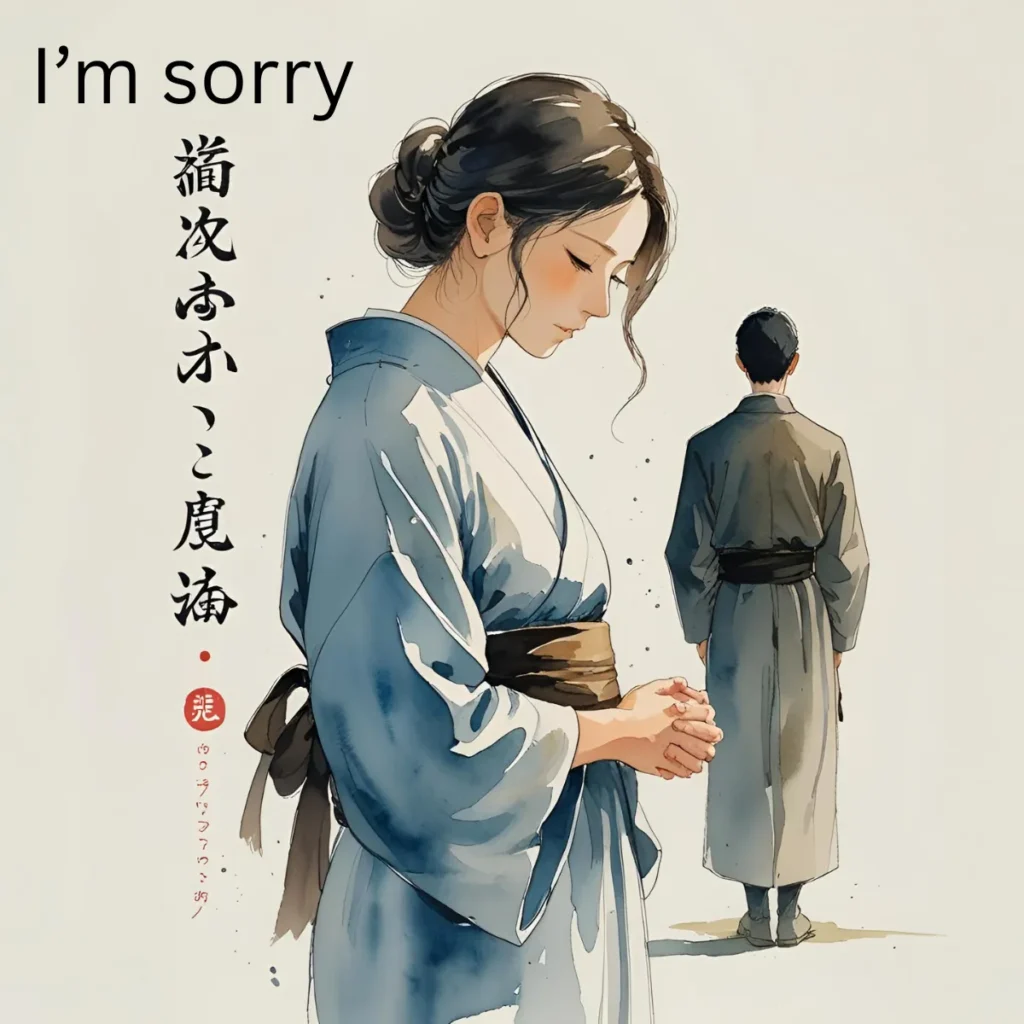Sorry” in Japanese is expressed using words like “Gomen” or “Sumimasen,” depending on the situation. While “Gomen” is casual, used with friends or peers, “Sumimasen” is more polite and appropriate in formal settings, showing respect and humility.
Many users search for how to say sorry in Japanese to apologize correctly in conversations, understand anime or Japanese media, or avoid cultural mistakes. The user intent is clear: they want simple, easy-to-use phrases that sound natural and polite.
In this guide, you will learn different ways to say sorry in Japanese, when to use each phrase, and their proper tone. These beginner-friendly explanations help you express apologies correctly in daily life or social interactions.
Say Sorry in Japanese
Let’s explore 15 meaningful and situational ways to say sorry in Japanese, with sample dialogues and the context behind each phrase.
15-phrases table for different ways to say Sorry in Japanese with English meaning:
15 phrases table for How to Say Sorry in Japanese
| # | English Phrase | Japanese Phrase | Romaji (Pronunciation) |
|---|---|---|---|
| 1 | Sorry | ごめん | Gomen |
| 2 | I’m sorry (polite) | ごめんなさい | Gomen nasai |
| 3 | I apologize | 謝ります | Ayamarimasu |
| 4 | Excuse me / Pardon me | すみません | Sumimasen |
| 5 | I deeply apologize | 申し訳ありません | Mōshiwake arimasen |
| 6 | I’m very sorry | 本当にごめんなさい | Hontōni gomen nasai |
| 7 | Sorry for the trouble | ご迷惑をおかけしました | Gomeiwaku o okake shimashita |
| 8 | Forgive me | 許してください | Yurushite kudasai |
| 9 | Sorry for being late | 遅れてごめんなさい | Okurete gomen nasai |
| 10 | Sorry, my fault | 私のせいでごめんなさい | Watashi no sei de gomen nasai |
| 11 | Sorry to interrupt | お邪魔します | Ojama shimasu |
| 12 | I humbly apologize | 申し訳ございません | Mōshiwake gozaimasen |
| 13 | Sorry for the mistake | 間違えてすみません | Machigaete sumimasen |
| 14 | Sorry, I didn’t mean to | 意図したわけではありません、ごめんなさい | Ito shita wake dewa arimasen, gomen nasai |
| 15 | Sorry for keeping you waiting | お待たせしてすみません | Omatase shite sumimasen |
1. ごめんなさい (Gomen nasai) – “I’m sorry”

Origin:
This is the most common and general form of apology. “Gomen” comes from “gomennasai,” which literally means “I beg forgiveness.”
Example:
👤 User A: ごめんなさい!遅くなりました。
(Gomen nasai! Osoku narimashita.)
👤 User B: 大丈夫だよ。気をつけてね。
(Daijōbu da yo. Ki o tsukete ne.)
“Sorry! I’m late.”
“It’s okay. Be careful next time.”
Use: Everyday apology; suitable for friends, family, or slightly formal settings.
2. すみません (Sumimasen) – “Excuse me / Sorry”
Origin:
Originally meant to express gratitude or hesitation. Over time, it became a polite way to apologize or get someone’s attention.
Example:
👤 User A: すみません、人を押してしまいました。
(Sumimasen, hito o oshite shimaimashita.)
👤 User B: あ、気にしないでください。
(Ah, ki ni shinaide kudasai.)
“Excuse me, I accidentally pushed you.”
“Oh, don’t worry about it.”
Use: Very versatile; used in both apologies and when thanking someone.
3. 申し訳ありません (Mōshiwake arimasen) – “I have no excuse”
Origin:
A deeply humble phrase that literally means “there’s no explanation (for my actions).”
Example:
👤 User A: 本当に申し訳ありませんでした。
(Hontō ni mōshiwake arimasen deshita.)
👤 User B: わかりました。次は気をつけてください。
(Wakarimashita. Tsugi wa ki o tsukete kudasai.)
“I’m truly sorry.”
“I understand. Please be more careful next time.”
Use: Very formal; used in professional settings or when making a serious apology.
4. ごめん (Gomen) – “Sorry” (Casual)

Origin:
A shortened, casual version of “Gomen nasai.”
Example:
👤 User A: ごめん、連絡忘れた!
(Gomen, renraku wasureta!)
👤 User B: いいよ、気にしないで。
(Ii yo, ki ni shinaide.)
“Sorry, I forgot to contact you!”
“It’s okay, don’t worry.”
Use: Informal; use with close friends or family.
5. 悪かった (Warukatta) – “My bad / I was wrong”
Origin:
Comes from “warui” (bad) and is the past tense form. It’s a rough, informal way to admit fault.
Example:
👤 User A: あ、ごめん。俺が悪かった。
(A, gomen. Ore ga warukatta.)
👤 User B: まあ、いいよ。終わったことだし。
(Mā, ii yo. Owatta koto dashi.)
“Ah, sorry. It was my fault.”
“Well, it’s okay. It’s over now.”
Use: Casual and masculine; often used among male friends.
6. すいません (Suimasen) – Informal/slurred “sumimasen”
Origin:
This is a colloquial, shortened pronunciation of “sumimasen,” common in casual speech.
Example:
👤 User A: すいません、今いいですか?
(Suimasen, ima ii desu ka?)
👤 User B: どうぞ。
(Dōzo.)
“Sorry to bother you, is now okay?”
“Go ahead.”
Use: Informal, spoken-only version of “sumimasen.”
7. 失礼しました (Shitsurei shimashita) – “I was rude / I’m sorry for being impolite”

Origin:
“Shitsurei” means “discourtesy.” This phrase acknowledges you acted inappropriately.
Example:
👤 User A: 会議中に電話して、失礼しました。
(Kaigi-chū ni denwa shite, shitsurei shimashita.)
👤 User B: 次回はマナーモードにしてください。
(Jikai wa manā mōdo ni shite kudasai.)
“Sorry for taking a call during the meeting.”
“Please put it on silent next time.”
Use: Polite/formal; for small social or professional infractions.
8. お詫びします (O-wabi shimasu) – “I offer my apology”
Origin:
Derived from “wabi” (apology). It’s used in writing or formal public apologies.
Example:
👤 User A: ご迷惑をおかけしたことをお詫び申し上げます。
(Go-meiwaku o okake shita koto o o-wabi mōshiagemasu.)
“I sincerely apologize for the inconvenience caused.”
Use: Extremely formal; used in letters, emails, or press releases.
9. ごめんな (Gomen na) – “Sorry, okay?”
Origin:
Informal male speech. The “na” adds a soft emotional touch.
Example:
👤 User A: ごめんな、心配かけて。
(Gomen na, shinpai kakete.)
👤 User B: 本当に心配したよ!
(Hontō ni shinpai shita yo!)
“Sorry for making you worry.”
“I really was worried!”
Use: Informal, often male, with close relationships.
10. 許して (Yurushite) – “Forgive me”
Origin:
From the verb “yurusu” (to forgive). A more emotional way to ask for forgiveness.
Example:
👤 User A: 許して。本当に反省してる。
(Yurushite. Hontō ni hansei shiteru.)
👤 User B: 今回だけはね。
(Konkai dake wa ne.)
“Please forgive me. I truly regret it.”
“Just this once.”
Use: Emotional or dramatic situations.
11. 悪いね (Warui ne) – “Sorry about that”
Origin:
Casual male speech. Rough but not aggressive.
Example:
👤 User A: あ、悪いね、遅れちゃって。
(A, warui ne, okurechatte.)
👤 User B: 平気だよ。
(Heiki da yo.)
“Ah, sorry I’m late.”
“No problem.”
Use: Informal, especially male-to-male interactions.
12. お許しください (O-yurushi kudasai) – “Please forgive me” (formal)
Origin:
Very polite form of “yurushite.” Often used in writing or respectful speech.
Example:
👤 User A: ご迷惑をおかけして、お許しください。
(Go-meiwaku o okake shite, o-yurushi kudasai.)
“I deeply apologize and ask for your forgiveness.”
Use: Very formal; respectful, professional apologies.
13. 勘弁して (Kanben shite) – “Cut me some slack / Let it go”
Origin:
Casual phrase meaning “Please be lenient.” Often used in light, informal speech.
Example:
👤 User A: また遅刻?
(Mata chikoku?)
👤 User B: 勘弁してよ、電車が止まったんだ。
(Kanben shite yo, densha ga tomattan da.)
“Late again?”
“Give me a break—the train stopped!”
Use: Very casual and often humorous.
14. 頭を下げます (Atama o sagemasu) – “I bow my head in apology”
Origin:
Symbolizes deep regret and humility. Bowing is a central part of Japanese apology culture.
Example:
👤 User A: 心からお詫びします。頭を下げます。
(Kokoro kara o-wabi shimasu. Atama o sagemasu.)
“I sincerely apologize and bow my head.”
Use: Very formal and humble; verbalized gesture of bowing.
15. 深く反省しています (Fukaku hansei shiteimasu) – “I deeply reflect on my actions”
Origin:
Used to show regret and commitment to improvement, often in business or public statements.
Example:
👤 User A: 今回の件について、深く反省しています。
(Konkai no ken ni tsuite, fukaku hansei shiteimasu.)
“I deeply reflect on this matter.”
Use: Formal, used in apologies where improvement or acknowledgment of guilt is key.
FAQs
- What is the most common way to say sorry in Japanese?
The most common word is “すみません (Sumimasen).” - How do you pronounce “すみません”?
It’s pronounced su-mee-mah-sen. - Is “Sumimasen” formal or informal?
It’s polite, suitable for both casual and formal situations. - What is another way to say sorry in Japanese?
You can also say “ごめんなさい (Gomen nasai)” for a more heartfelt apology. - How do you apologize casually to friends?
Say “ごめん (Gomen)”, which is short and informal. - Can I use “Sumimasen” to get someone’s attention?
Yes, it’s commonly used in stores or on public transport to politely say “excuse me.” - How do you say “I’m really sorry” in Japanese?
Say “本当にごめんなさい (Hontō ni gomen nasai).” - Is it okay to use these phrases in writing?
Yes, you can use Gomen nasai or Sumimasen in messages or emails. - Can body language make a Japanese apology stronger?
Yes, bowing slightly while apologizing shows respect and sincerity. - Are these phrases used throughout Japan?
Yes, all are widely understood and used across Japan.
Conclusion:
In Japan, saying sorry goes beyond words—it reflects a deep sense of humility, respect, and emotional connection.By understanding this cultural practice, we learn that an apology is not just about admitting fault, but also about strengthening relationships and showing care for others.



